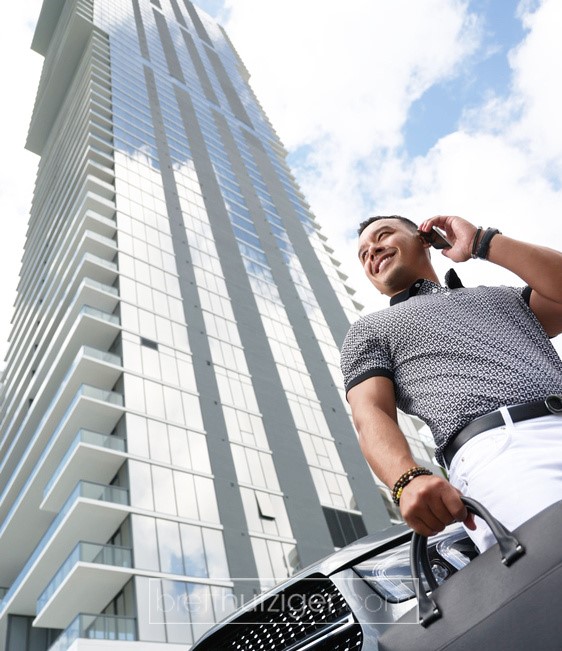Meet Exhibit A of the Great Migration: Aaron Chan. Why would the founder, owner and director of operations of the Boston-based company LCG Health Wellness & Recovery decide to live full-time in Miami’s Edgewater neighborhood? And is the term “Boston-based” therefore even accurate? True, the company Chan founded offers services for emergent healthcare staffing, COVID-19 testing and vaccination operations across Massachusetts and has partnered with the city of Boston, the Boston Public Health Commission and Boston Public Schools, but most days, if he’s not in Edgewater helping to raise his infant son with his former fiance, Chan can be found toting his laptop and his dog to the 1 Hotel South Beach and the Standard Spa—he has memberships at both. Why does he do this? Because he can. Chan explains to SFBW how he ended up being a happy, tropical digital nomad.
Aaron, you have a head for business but a medical background. Can you tell us about the latter?
I graduated with my nursing degree from UMass Boston in 2011, and I spent around four years in emergency medicine at Massachusetts General Hospital, and also worked in post-transplant—kidney, heart, you name it. This is redundant as emergency medicine above refers to the emergency department. It’s pretty punishing work, both mentally and physically but it gave me the foundation of knowledge I have today, of which I was able to build upon. It was very easy to get burnt out though, especially rotating nights and days, depending on the staffing and the patient population. I would look at some people who’d been working for 20 or 30 years and it amazed me how rubbed / worn down they were. It is truly a selfless service, and it does take a special person to really commit their career as a nurse because it is a lot of work. It’s physically and emotionally draining, with the number of hours and overtime you have to provide on a whim, because it’s the right thing to do for the patient. I have enormous respect for the profession, I just didn’t see myself in that specific environment long term.
You spent several years at a start-up, Iora Health, as the RN health lead. Did that experience spark your entrepreneurial fire?
Just being at Iora and seeing the culture and the business model and meeting the CEO and the two other founders—I always thought, Why can’t I do something? I wanted to be a leader and felt like I never had a voice. I have a lot of opinions, a lot of thoughts about how things should operate, or changes that should be made within the company. That part became frustrating for me.
LCG Health launched in an unusual way, right? It grew out of the hospice care you were providing after your tenure at Iora.
Yes, my initial passion was for hospice care —and I had all these ideas about how in-home hospice care could be better. That’s how my business originated—I decided I wanted to launch my own private health care company where we would personally train our staff and send them into homes to provide quality medical support, hospice or not. In the fall of 2018, I took care of a patient, helping her get through the end-of-life process. And her aunt ended up being a mulit-billionaire, very well-known. She encouraged me, “You are so good at what you do. I want to help you—let me know when you are ready to do this. I want to be a resource for you.” She never said, “I will finance you.” But she was my initial motivation. It was enough to get me going at the time.
Flash forward to the end of 2019. You presented your business plan to her and she did end up staking you, along with two other investors. When was your first profitable month?
March 2020. We netted $5,000.
Did the company ever have a physical office?
No.
When you moved here in December 2021, what was your total revenue?
For 2021, our revenue totaled $23 million. And we’ve done $16 million in revenue since I moved down here.
You’ve just made my point. Not only did being a digital nomad not hurt your business, but it actually enhanced it.
Absolutely. As we delegate to trusted colleagues, it actually enhances our ability to scale.
And you’re always on the move.
Yes, I love being in different environments. I love running into new people. The Standard has an amazing community; you have all of these entrepreneurs that you’re surrounded by, and motivated individuals who are looking to innovate and create. A lot of people are in the digital space. And the 1 Hotel is actually a better spot to bring your laptop and get work done, and it holds a lot in the way of membership events. A couple weeks ago I went to a members-only yacht-dock party and had the opportunity to meet other successful business owners and entrepreneurs—and all kinds of people who add value, professionally, just through their personal experience.
Compare the networking scene in Boston to what you’re experiencing in Miami.
[Boston] doesn’t compare.
And you’re far from the only transplant from Boston.
Not even close. The first week I was down here I met four guys who had a loose connection to me, all from Boston, all business owners from Boston and living down here. There is also an enormous number of transplants from Los Angeles, Washington DC and New York City. I think people are finding that working digitally and remotely is equally, if not more, productive than going into an office space. They no longer have to live in a place solely because they have to go into an office.
Photography by Brett Hufziger














